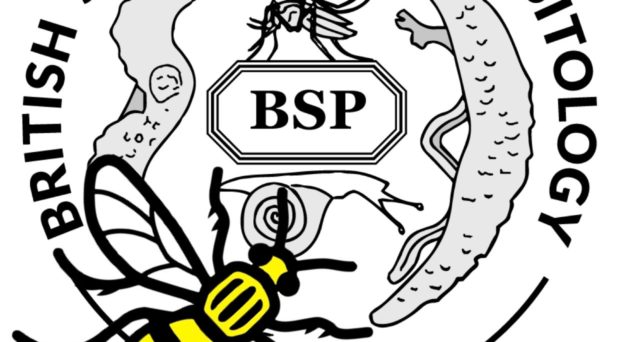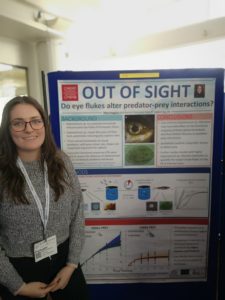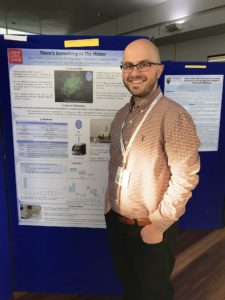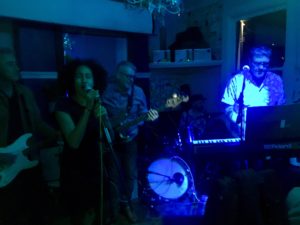
Manchester is not renowned for its climate, as observed by our kid Noel who got his brother to sing: “You could wait for a lifetime to spend your days in the sunshine”. However the clouds parted, the wind settled, and Spring finally arrived just in time for the British Society for Parasitology 2019 Spring Meeting. Talks, poster sessions and workshops were all held in the Grade 2 listed Renold Building, a stones throw away from the bustle of central Manchester, offering an extremely Manchester-esque experience for all. The complete timetable and abstract book is available to download here.
After a welcome to the conference from local organisers Kathryn Else and Ilaria Russo, and the President and Vice-Chancellor of the University of Manchester, Dame Nancy Rothwell, it was time for the proceedings to begin.
Patricia Wright kick-started the conference with her opening plenary, a whistle stop tour through her career long links with the lemurs of Madagascar, who, following 40 million years of isolation from humans and other primates, host some rather unique parasites. However, with human populations encroaching further into Madagascar’s rainforest ecosystem, spillover of parasites and pathogenic enteric bacteria into wild lemur populations has occurred. Patricia, along with others, has spent much of her time investigating this (as well as coordinating the establishment of the Ranomafana National Park region!).
Tracing trematodes
The first day finished with delegates splitting into different sessions. Those attending the Human Interventions stream saw Lisette Van Lieshout sharing developments in using the adult worm circulating antigen (CAA) for the early diagnosis of acute schistosomiasis in travellers in comparison with other diagnostics. She particularly highlighted the well-known fact that using this proxy can differentiate active from past infections.
Over in the Host-Pathogen Interactions stream, Tomáš Macháček humoured delegates with his talk explaining how his research came to the ‘doorstep’, reporting on an outbreak of cercarial dermatitis (a skin condition caused by accidental penetration of human skin by avian schistosomes) outside of Charles University, Prague.
Elsa Leger followed this by highlighting the one health theme of the conference with her talk on the role of zoonotic schistosomiasis in West Africa, schistosome hybridization and its implication for control of human schistosomiasis.
Parasite “Transmission” in assorted Ecosystems
The Ecology and Ecosystems stream at each BSP meeting brings together a rather mismatched array of parasitologists, allowing for a diverse set of talks in a single room; this year being no different! Highlights included hearing Natalia Fraija-Fernández (winner of BES best Ecology and Ecosystems presentation) talk about the incredibly unique opportunity she has had to explore the helminths of cetaceans, non-invasively, by collecting stool samples and utilising next-generation sequencing to identify and characterise the parasites of these marine giants. This technique has uncovered some surprises along the way, with multiple sequences being obtained from parasites unknown to science – one to look out for.
Anna Paziewska-Harris also shared her research into the population genetic structure of Cryptosporidium, and most interestingly, how it can be determined by the sanitation structure available to endemic populations (i.e. a ‘toilet ecosystem’).

Poster pitches
Poster pitches were a welcome addition to the meetings programme this year, giving the opportunity to poster presenters to stand up for a couple of minutes and attract delegates to their poster. From these pitches, the award for the best poster pitch was given to Lucas Cunningham, whose poster on the evidence of the absence of Trypanosoma brucei gambiense in North West Uganda, proved that ‘no’ results can be communicated in a positive and stimulating light for delegates.
Other poster winners included; Masters student Meg Huggins for her poster on Diplostomum spp. effect on three-spined sticklebacks prey choice,

Božo Lugonja’s poster investigating novel mechanisms such as microwave technology to remove robust Cryptosporidium oocysts during water treatment and Hannah Smith’s poster studying the role of macrophage associated protein marker Ym1 in Trichuris muris expulsion and intestinal inflammation.
“Rusholme Ruffians” (…almost)
The first night of entertainment was generously supported by the British Ecological Society Parasite and Pathogen Special Interest Group (a group that brings together academics with an interest in parasite ecology and evolution) who hosted a reception along with the Young Parasitologist Party at The Old Abbey Taphouse in the centre of the Manchester science park.

Food and drinks were plentiful, and to help wash it all down was music from The Pumphandle Blues Band, a group formed on this occasion by musical parasitologists including this year’s Wright Medal Winner Russell Stothard (more on this in the next blog !), BSP’s Vice-President Colin Sutherland and member David Conway, who provided a selection of hits and gave delegates a chance to have a dance and stretch the legs before another day of conference proceedings.
All this and many other fascinating presentations on the first day of the conference were followed by more talks, Society news during the Annual General Meeting and recognition of outstanding achievements in the award presentations. Look out for my second blog, covering all of this on Tuesday next, May 7th.
Additional information: The BSP 2019 Autumn Symposium ‘Post-genomic progress in helminth Parasitology’ will be held at Queens University Belfast on the 23rd of September, followed by the Irish Society for Parasitology meeting in Riddle Hall the following day.
BSP Acknowledge: Organisers Kathryn Else and Ilaria Russo, other staff and students from at the University of Manchester, Qiagen, British Ecological Society, eLIFE, Parasites and Vectors, Elsevier, Nikon, Thermo/Fisher Scientific, Cambridge University Press, New Elgland BioLabs and The Royal Society for a successful BSP Spring Meeting.

Comments